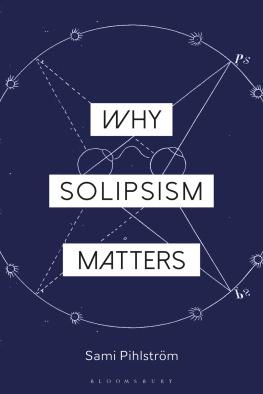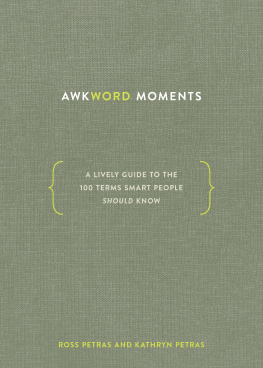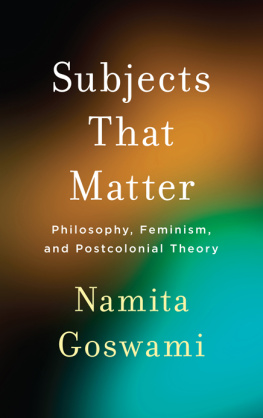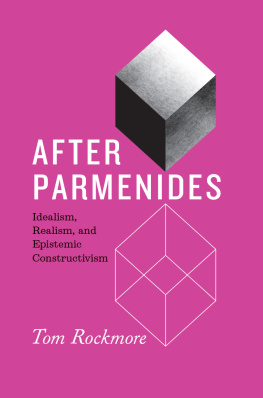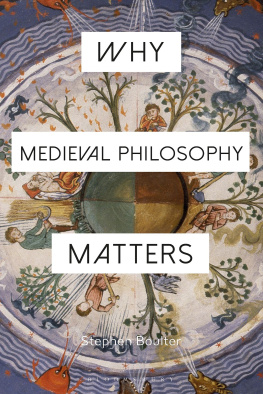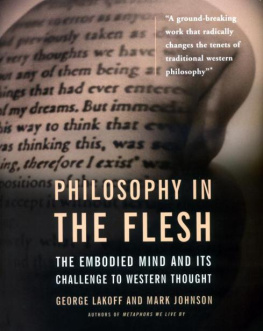Why Solipsism Matters
WHY PHILOSOPHY MATTERS
Series editor: Professor Constantine Sandis, University of Hertfordshire, UK
Why Philosophy Matters focuses on why a particular philosopher, school of thought, or area of philosophical study really matters. Each book will offer a brief overview of the subject before exploring its reception both within and outside the academy and our authors will also defend different provocative outlooks on where the value of philosophy lies (or doesnt, as the case may be). Why Philosophy Matters is accompanied by an ongoing series of free events (talks, debates, workshops) in Bloomsbury. Podcasts of these events will be freely available on the series page.
Books in this series
Why Iris Murdoch Matters , Gary Browning
Why Medieval Philosophy Matters , Stephen Boulter
Also available from Bloomsbury
Nihilism and Philosophy: Nothingness, Truth and World , Gideon Baker
The Meaning of Life and Death: Ten Classic Thinkers on the Ultimate Question , Michael Hauskeller
The Philosophy of Death Reader: Cross-Cultural Readings on Immortality and the Afterlife , ed. Markar Melkonian
Why Solipsism Matters
Sami Pihlstrm

Contents
I would like to begin by thanking a crucially important philosophical teacher I had in the early stages of my academic life, Heikki Kannisto, without whom this project would never have been begun. It was Kannistos series of lectures on Wittgenstein at the University of Helsinki in 1993 that triggered my interest in solipsismto the extent that I wrote a series of essays on the topic in the 1990s and early 2000s (Pihlstrm 1996b, 2000, 2001, 2004). Some of the results of that early work were later included in my books addressing death and guilt (Pihlstrm 2011, 2016).
The present investigation obviously takes its departure from my early research on solipsism and related themes, but its approach is different. In the context of this book series, I now primarily seek to show why, and how, the problem of solipsism matters to us as human beings, examining this specific issue in relation to the meta-level question about why, and how, philosophy itself matters.
A number of colleagues and friends have over the years considerably contributed to the development of my views on solipsism. In addition to Dr. Kannisto, they include, among others, Hanne Appelqvist, Leila Haaparanta, Sara Heinmaa, Lars Hertzberg, Heikki J. Koskinen, Simo Knuuttila, Olli Koistinen, Ilkka Niiniluoto, Anssi Perkyl, Panu-Matti Pykk, Henrik Rydenfelt, Naoko Saito, Seppo Sajama, Tero Vaaja, Thomas Wallgren, and Kenneth R. Westphal. Some of my reflections in this book may be regarded as responses to discussions with these and many other scholars. I also try to implicitly respond to Richard Schantzs (2008) valuable criticisms of my earlier work on solipsism. Moreover, I am grateful to Constantine Sandis for the initial suggestion that I might propose this book to the Why Philosophy Matters book series, and to Liza Thompson, Lucy Russell, and Lisa Goodrum at Bloomsbury for smooth collaboration. I would also like to thank the anonymous reviewers who have evaluated this project both at the book proposal stage and at the full manuscript stage, presenting useful and constructive criticism. Over the past couple of years, some of this material has been presented as talks at the University of Helsinki, University of Turku, and Sapienza University in Rome.
My greatest debt is to Sari Kivist, with whom I have authored two thoroughly non-solipsistic books and several articles. Her influence may not be as explicit in this work as in some others of mine, but it is implicit in almost everything I write. I also gratefully acknowledge my entire (immediate and extended) family, especially my daughters Meeri and Katri, and their fundamental role in enabling me to avoid solipsism.
Helsinki, Finland
October 2019
Sami Pihlstrm
While philosophy, especially academic philosophy, might be regarded as an abstract activity far removed from anything that really matters to us as human beings, it is easy to think of philosophical topics that clearly matter. Consider the problem of determinism versus free will, for instance. I suppose most of us would admit that it does matter, perhaps greatly, whether we are (and if so, in what sense exactly) free in our actions and responsible for what we do or somehow programmed and determined to behave in the ways we do. Or consider typical problems of ethics: there can hardly be any doubt about issues concerning the good and the right, or their opposites, mattering to us. Many of us would also readily admit that even rather technical work in the philosophy of logic or the philosophy of science matters at least to the extent that it clarifies the structure of scientific reasoning, thus contributing to the advancement of science, while philosophers of religion may also be doing work that matters when debating on the criteria for reasonable or justified (or unreasonable and unjustified) religious belief.
Other philosophical topics may seem to matter less. Skepticism, for instance, maintains that we cannot know anything about the external world. Because almost all of our activities would continue as they are even if skepticism were true, many would claim that it matters little whether it is true or not (though it might matter whether we believe it to be true or not). Now, if there is any philosophical idea that has generally been considered extremely implausible, or even downright crazy, it is surely solipsism , the view that the world is my world, that is, nothing exists independently of my mind, my thought, or my experienceeither in the straightforward sense that everything there is is internal to my mind (e.g., my dream) or in the slightly more elaborated sense that everything there is depends for its existence on my mental activity and thus would not exist without me.
Indeed, solipsism may seem to be a paradigmatic example of a philosophical position that does not matter to us at all. It does not appear to play any role in our serious attempts to understand the world, society, and ourselves. Rather, it might be taken to be ridiculous to discuss solipsism with any seriousness. While we might be initially tempted by the radical skeptical scenario that there is no world external to our thought, or the solipsistic view that the world exists only due to our thinking, we usually drop such options as wildly implausibleeven insanefrom among the philosophical positions we seriously consider soon after having passed the introductory class in philosophy.
In this book I argue that solipsism matters much more than we might think. How exactly it matters can only be explained on the basis of a relatively detailed discussion of the different versions of solipsism philosophers have been preoccupied with.
By arguing that solipsism does matter, after all, this book more generally demonstrates that philosophy, even when dealing with highly counterintuitive and crazy ideas, may matter rather considerablyand in unexpected ways. The challenge of solipsism should make us rethink fundamental assumptions concerning subjectivity, objectivity, realism and idealism, and relativism, as well as ethicsthat is, our ethical relations to other human beingsand death and mortality.Logico-Philosophicus). The latter idea is argued to be both ethically and metaphysically, or even existentially, fundamental to our self-understanding.
Nevertheless, many readers will find it odd to even consider the issue of solipsism. No sane person is a solipsist anyway, so is there anything interesting to say? Why should one examine solipsism, especially if one is (as I am) a non-solipsist and believes there are other people who will (hopefully) read, understand, criticize, and possibly review a book like this?

